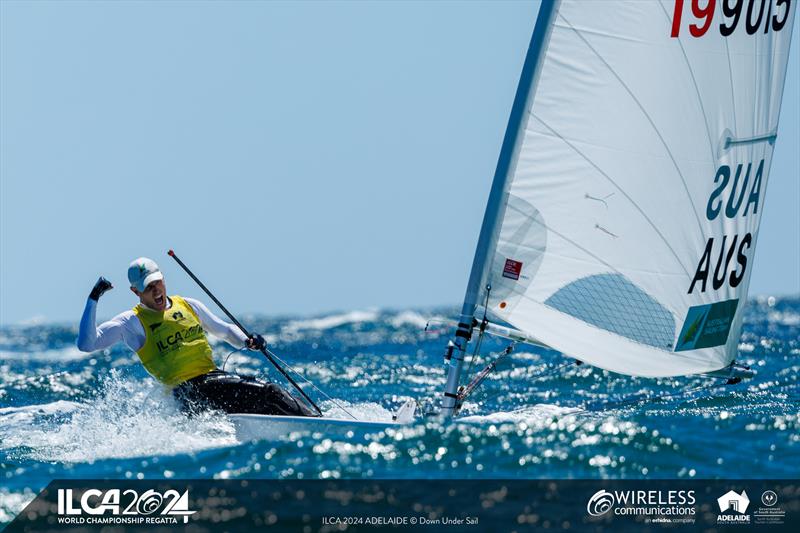
In Rarefied Company
by Mark Jardine 6 Feb 2024 12:00 PST

Matt Wearn crosses the line to win the 2024 ILCA 7 Men World Championship © Jack Fletcher / Down Under Sail
Winning the ILCA 7 Worlds is one of the pinnacle achievements in sailing. Winning it more than once puts you in rarefied company.
Until now, in the 50-year history of the Laser / ILCA 7 World Championship, just seven sailors have multiple world titles in the class: John Bertrand (USA, 2), Glenn Bourke (AUS, 3), Robert Scheidt (BRA, 9!), Ben Ainslie (GBR, 2), Tom Slingsby (AUS, 5), Nick Thompson (GBR, 2) and Pavlos Kontides (CYP, 2). That's quite a list.
Matt Wearn has just joined this list, which puts him amongst these legends, and it was by no means easy. The 152 entries at Adelaide Sailing Club saw a range of conditions, and after the second day Norway's Hermann Tomasgaard led the charge, but Wearn kept knocking in top results to take the lead on day 3. Great Britain's Micky Beckett kept the pressure on, just a single point behind Wearn after day 4, but the cream rose to the top, with the penultimate day, held in 25+ knot winds, proving decisive.
Going into the Medal Race with an 8-point lead, Matt then proceeded to find a clear lane at the start, leading at every mark, crossing the finish line first. That's how to win in style.
He's now gone back-to-back, winning both the 2023 and 2024 ILCA 7 World Championship titles, and he's the Olympic champion in the class, having won gold at Tokyo 2020.
Big wind sailing in a singlehanded hiking dinghy is tough. I can't count the number of times I've gone upwind, wishing the rounding mark closer, then trying to catch my breath for the first half of the downwind leg while trying not to get into a death roll.
At the top end of the sport there's no time to relax. The downwind legs are just as physical as the upwinds, and all the time you need to keep your head in the game to think tactically. The manoeuvres and kinetics on board need to be second nature.
We spoke to Matt after the Worlds to find out how he's developed his skills:
"I owe a lot of my hiking fitness to the base that was built through my early years in the boat. I was fortunate enough to be guided by Arthur Brett on what the right technique is, and have continued to use these philosophies through my entire career. This, I believe, allows me to be more efficient from a physical sense, which in turn keeps the heart rate lower and allows me to think clearer, especially at the back end of a 20 minute upwind. Obviously time in the boat and years of sailing in those types of conditions also gives you a great advantage when you need it."
The class itself, and strict one design sailing, means you can't lean on a technical advantage. At the big championships you don't even sail your own boat as the equipment is supplied, as Matt explained:
"The one design nature of the class means you are on an equal playing field. The fact that when we go to major events the boats are supplied, so you have to be able to adapt to the small variances, brings the best sailors to the top. The simplicity of the design, with minimal ability to change anything, means that you have to be on top of your tactical decisions due to everyone's boat speed being the same."
Being an Olympic year, sealing this win is a huge confidence boost ahead of Paris 2024, but also frees up Matt to work on any aspects of his sailing ahead of the Games:
"It's amazing! To win the Worlds last year and stamp my authority at the top of the fleet again was great, but to go back-to-back and also in an Olympic year feels amazing! It's so important to get good results on the board early in the year so you can concentrate on fixing what needs to be fixed pre-Games without the results pressure."
It is ominous indeed for his fellow competitors when the best is already looking at how to get better. Matt Wearn has truly entered the pantheon of greats and is the man to beat in Marseille when the Olympic ILCA 7 racing starts on Thursday 1st August.
Mark Jardine
Sail-World.com and YachtsandYachting.com Managing Editor